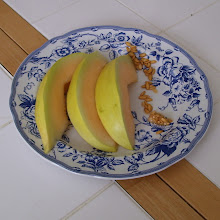| Stephen Sweeney, via Wikimedia Commons |
The New York Times is currently running a series of essays, under the
heading “Menagerie,” about the relations between humans and animals. I’m
interested in the word “menagerie,” its relationships to other words, and what
those connections among words suggest about the liaisons between the creatures
themselves, ourselves.
The French word ‘ménagerie,’ a collection of wild and exotic
animals, comes from the word ‘ménage,’ meaning household. ‘Ménage’ can also
refer to a sexual relationship among the members of a household.
But words are related not only
by etymology but also by association. When I see ‘menagerie,’ I
think of ‘ménage,’ then ‘ménage à trois.’ And then, because I love French, I
begin to think about merry-go-round horses and Edith Piaf.
“Tu me fais tour-rrrr-ner la
tête. Mon manège à moi, c’est toi.”
This is Piaf singing about a
lover as “my merry-go-round” in the 1958 song “Mon Manège À Moi.”
“You make my head spin. My merry-go-round, it’s you,” the translation goes.
‘Manège’ means riding arena,
a ring where people ride horses round and round. It can also refer to the ring’s
amusement-park equivalent, the merry-go-round.
Because menagerie refers to
animals, because merry-go-rounds often consist of horses (plastic or
metal though they may be), because ‘manège à moi, c’est toi’ sounds like ‘ménage à trois,’ I at
first thought that ménage and manège were the same word. In the song, Piaf—well,
actually lyricist Jean Constantin—equated the two. Her ménage, her
relationship, was her manège, her merry-go-round, her thrill.
But no, they are different
words with different roots. ‘Manège’ comes from the Italian ‘mannegiare,’ to
handle. It’s based on the Latin word for hand, ‘manus,’ and the idea, I
suppose, of maneuvering horses in the ring.
But how does ménage relate
to menagerie? Consult Le Petit Robert,
the very thick yet somehow abridged French dictionary, and you’ll find that ménage,
in its modern usage, has no animal association. Yet menagerie comes from this
root. Is a menagerie a household for animals? Or are
houses—and relationships—cages for people?
It turns out that centuries
ago, the word ménagerie, at least in French, did have an animal connection: it referred to the running of both
household and farm. Along those lines, there is such a thing as a house-barn,
where farm animals live in the same building as their owners, conserving body
heat. A ménage can be a menagerie.
‘Ménage’ is derived from ‘mansio,’ a Latin word for house or
dwelling, and that from the Latin verb ‘maneo, manere,’ meaning to remain, stay.
Thousands of years ago,
humans didn't remain anywhere for long; they moved with the beasts they hunted.
Dwellings were accordingly temporary. Why stay in any one place unless the
animals—and more generally, the food supply—do so, too? With fenced in animals and
crop cultivation came more permanent homes. The development of ménages and
menageries went hand in hand.
Thinking of nomadic cultures
brings to mind another vagrant, human-animal coexistence: the circus. A circus
is collection of people and animals unique and amazing. It involves captive
animals, yet it is not sedentary; it migrates, equipped with both cages
and tents.
Circus was the word Philip
Astley, known as the father
of the modern circus, used for a riding ring. Thus the circus began, literally,
as a manège, for trick riding, and later grew to include other acts, other
animals. A circus is both manège and menagerie.
I once bought a t-shirt
showing two birds perched together in a birdcage with its door wide open. The
idea, the street vendor explained to me, was that the birds could fly away but
chose to stay together in their birdcage (birdhouse?).
As I see it, the chief
difference between a ménage and a menagerie is that in a human
household, people choose to stay, while captive animals have no choice. There are grey areas in both domains, however. Humans who could quit their ménages at any time feel many
pressures to stick around. As for animals: though you might rightly call indoor pets “captive,” they don’t necessarily want to run away.
The message of the Piaf song
is that the singer is so enthralled by her lover that she feels no need to
rove. “Je ferais le tour du monde; ça ne tournerait pas plus que ça. La terre n’est
pas assez ronde pour m’étourdir autant que toi.” (“I could go around the world and that wouldn’t turn
more than this. The world isn’t round enough to stun, or dizzy, me as much as
you.”) A merry-go-round is, in
part, a way to experience the feeling of covering distance without going
anywhere, and the merry-go-round relationship is a stationary thrill. The motion of the manège, however metaphorical,
enables the stability of the ménage.
When the cage door is open,
my fancy flies pretty far and returns with diverse ideas for me to assemble. I
want them all in my menagerie. They make my head spin.

No comments:
Post a Comment